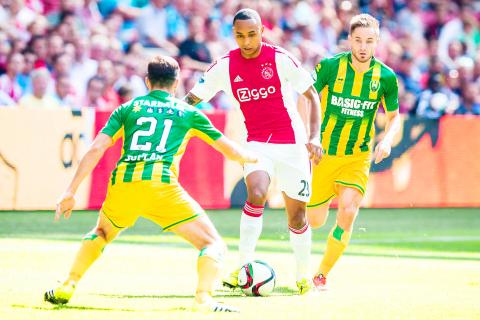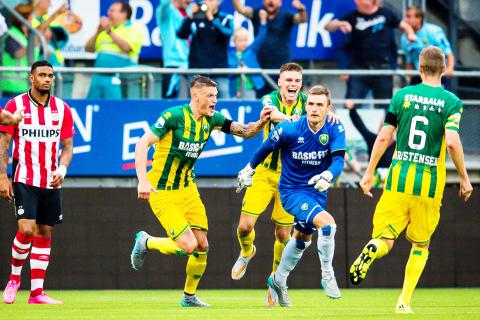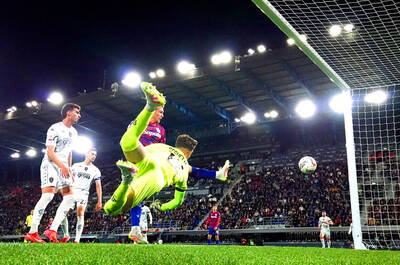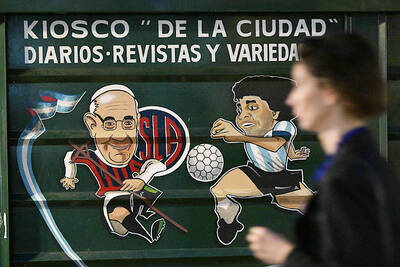A new Chinese owner arrived at Dutch soccer club ADO Den Haag in 2014, promising multimillion-dollar investments and better days ahead. Fans of the club liked the sound of that.
Yes, the money to buy the team arrived a few months late, but it did arrive in the end, along with firm deadlines for further investments and a handful of new signings.
Even if the most ardent fans were wary of the new owner’s intentions, they held their tongues.

Photo: EPA
ADO, a 110-year-old club, have not won the Dutch league, known as the Eredivisie, since the end of World War II, but the new owner, a businessman named Wang Hui, promised to turn them into a powerhouse — one that could challenge the likes of Ajax, PSV Eindhoven and Feyenoord, clubs that have long dominated Dutch soccer, and play well enough to qualify for the UEFA Champions League.
Wang seemed like fun, wildly cheering goals from his box at ADO’s Kyocera Stadium and throwing up his hands in disbelief whenever the team conceded a penalty. At least once, he even took part in a practice session with the players.
“Wang was very enthusiastic,” ADO Den Haag Supporters’ Association chairman Jacco van Leeuwen said. “He promised European football, so everyone was very happy with him. We showed a banner with Wang on it.”

Photo: EPA
However, 18 months later, supporters’ patience is wearing thin. ADO Den Haag are mired in the middle of the Dutch standings, the flashy signings have stopped and Wang has missed several deadlines to make payments he promised. Some at the club fear that Wang, who spent millions to buy the club and pledged millions more to improve it, has lost interest.
Wang, in an interview in his Beijing office, said he was merely recalculating his strategy, but he also said that he was under no obligation to do more than he had.
“After I pay the takeover, the club is mine,” Wang said. “It is my business in terms of how much I will invest in the club.”
That change in attitude might not go down well in The Hague. While ADO supporters collected food and supplies to be distributed to poor people in the weeks before Christmas, they also have a fearsome history — in the 1980s they were even accused of setting fire to their own stadium, the Zuiderpark.
To people from The Hague, words and actions matter.
“In Den Haag, the character of the people is that when you don’t like it, you say it directly, you don’t hide,” Van Leeuwen said. “So we have a rough reputation.”
‘PRACTICE’ MOTTO
ADO Den Haag is the only major soccer club in The Hague, a coastal city and the seat of government in the Netherlands. ADO Den Haag — in Dutch, ADO is an acronym for “everything through practice” — came to represent the city’s large working-class population. The club enjoyed little success in the post-war era and instead gained notoriety for a following that included some of Europe’s toughest hooligans.
“It was always a mid-table club, but a good club, good young players coming from The Hague,” said Dick Advocaat, a former coach of the Dutch national soccer team who began his playing career at ADO.
Despite the large sums of Asian money that have been invested in European soccer — including a US$400 million Chinese investment last month in Manchester City, a club bought by the royal family of Abu Dhabi in 2008 — few expected ADO Den Haag to be ready to join Europe’s elite.
Enter Wang, a wealthy, Beijing-based businessman whose marketing company, United Vansen International Sports, helped organize the closing ceremony of the 2008 Beijing Olympics. He bought a 98 percent stake in ADO for a reported US$8.9 million and announced his intention to take the club into European competition, while sending Dutch coaches from the club to China to improve the nation’s young players.
“At the time, we had a clear preference this was sold to local businessmen,” said Tom de Bruijn, a politician who sits on The Hague’s municipal executive committee and was close to the deal.
The municipality owns the Kyocera Stadium and had a so-called golden share in the club, meaning it could block any purchase on one condition — that the club find another buyer willing to pay the same price for the shares — but no local investors came forward and, after verifying that Wang’s finances were legitimate, the club was sold.
Despite the agreement, it took months for the money to materialize. When it did, a period of optimism followed. Further investments were made and expensive new players were acquired, including Dutch-Japanese striker Mike Havenaar, and Wang was seen at several matches.
When Dutch Prime minister Mark Rutte visited China with a trade delegation, Wang presented him with a green-and-gold ADO shirt. Rutte took it with good humor when he noticed his name was written “Rutten” on the back.
While a handful of ADO coaches went to Beijing to coach at the former school of Chinese President, Xi Jinping, an avid soccer fan, former China national team coach Gao Hongbo was unveiled as an ADO assistant coach.
Gao’s move caused tension. After every game, ADO coach Henk Fraser was asked by reporters whether he was about to be replaced.
“To be honest, I spoke to him occasionally, but he is not part of my training staff,” Fraser said of Gao. “He was here to get the Dutch way of working. Most of the time, he was upstairs in one of the units watching the way we train.”
When Fraser was asked about Wang, the club ended the interview.
The greatest tensions, though, were related to finances. Deadlines for Wang to make a further US$4.1 million investment in the club in September and November last year were missed. More important, the club was forced to admit that it had not been able to speak with Wang.
A third deadline, on Dec. 18, had been agreed upon for the money, shortly after a league match against Willem II, but that, too, passed without payment.
The uncertainty has left many people in the city unhappy, not least Advocaat, who had called for the Chinese influence at ADO to come to an end.
“He had some good ideas, but you’ve got to do it,” said Advocaat, who acknowledged that he had discussed taking an advisory role at the club with Wang. “But now he is not paying the money. That is why I said people from Den Haag should take over.”
On the 22nd floor of a building in downtown Beijing, Wang keeps a small ADO Den Haag pennant pinned to his bookcase. He was not hard to locate and he quickly agreed to an interview.
‘BEST INTENTIONS’
Wang said that his plans for revitalizing ADO remain unchanged. He promised that he still had the best intentions for the club and that the US$4.1 million would be paid.
“I hope that ADO can get in to the top five clubs in Eredivisie in three years — that’s my goal,” he said. “To achieve this goal, we can invest more money and do whatever necessary.”
Wang also partly blamed cultural differences for the current tension — in The Hague, Advocaat said of the forthright attitude of city’s populace, “black is black and white is white” — as well as ADO’s modest start to the season.
“The club thinks in a very simple way: ‘You’ve said you will invest, so you should invest,’ but they are intervening the boss’ decisionmaking process. You can offer suggestions, but now the circumstances are different and I need to adjust my strategy” Wang said.
When asked specifically about the missed payments, Wang said the money was “not a promise because I don’t need to promise anything to anyone in terms of investing more money into my own club, but as long as you want to do better and you don’t have enough money to do so, of course I’m willing to help.”
In The Hague, there were no banners or chants against Wang in the stands before Dutch soccer’s midwinter break. Before the game against Willem II, Van Leeuwen, on behalf of the supporters, wrote an open letter to Wang asking for a meeting and promising that the fans would give Wang time to prove his intentions.
“Now everyone is very quiet because you can say everything about the Chinese, but then you make him angry,” Van Leeuwen said.
Still, the Dec. 18 deadline came and went. The money was not paid and Wang did not visit the club, saying he had canceled because of an important meeting with the Chinese Football Association.
A spokesman for the club said on Sunday that the money had not arrived, but that the club was hopeful it would this week.
The spokesman, who said the club hoped Wang might visit this month, said that he “had seen documents that prove the money is on the way — that has rebuilt trust.”
The midwinter break is giving ADO time to sort out the situation, but the fans will not wait forever. The first game after the break, on Jan. 17, is the biggest of ADO’s season, against top-of-the-table Ajax.
“If the money isn’t there by then, I think you will see banners and then there will be a problem,” Van Leeuwen said.

Bologna on Thursday advanced past Empoli to reach their first Coppa Italia final in more than half a century. Thijs Dallinga’s 87th-minute header earned Bologna a 2-1 win and his side advanced 5-1 on aggregate. Giovanni Fabbian opened the scoring for Bologna with a header seven minutes in. Then Viktor Kovalenko equalized for Empoli in the 30th minute by turning in a rebound to finish off a counterattack. Bologna won the first leg 3-0. In the May 14 final in Rome, Bologna are to face AC Milan, who eliminated city rivals Inter 4-1 on aggregate following a 3-0 win on Wednesday. Bologna last reached the

If the Wild finally break through and win their first playoff series in a decade, Minnesota’s top line likely will be the reason. They were all over the Golden Knights through the first two games of their NHL Western Conference quarter-finals series, which was 1-1 going back to Minnesota for Game 3 today. The Wild tied the series with a 5-2 win on Tuesday. Matt Boldy had three goals and an assist in the first two games, while Kirill Kaprizov produced two goals and three assists. Joel Eriksson Ek, who centers the line, has yet to get on the scoresheet. “I think the biggest

From a commemorative jersey to a stadium in his name, Argentine soccer organizers are planning a slew of tributes to their late “Captain” Pope Francis, eulogized as the ultimate team player. Tributes to the Argentine pontiff, a lifelong lover of the game, who died on Monday at the age of 88, have been peppered with soccer metaphors in his homeland. “Francisco. What a player,” the Argentine Football Federation (AFA) said, describing the first pope from Latin America and the southern hemisphere as a generational talent who “never hogged the ball” and who showed the world “the importance of having an Argentine captain,

Noelvi Marte on Sunday had seven RBIs and hit his first career grand slam with a drive off infielder Jorge Mateo, while Austin Wynn had a career-high six RBIs as the Cincinnati Reds scored their most runs in 26 years in a 24-2 rout of the Baltimore Orioles. Marte finished with five hits, including his eighth-inning homer off Mateo. Wynn hit a three-run homer in the ninth off catcher Gary Sanchez. Cincinnati scored its most runs since a 24-12 win against the Colorado Rockies on May 19, 1999, and finished with 25 hits. Baltimore allowed its most runs since a 30-3 loss to